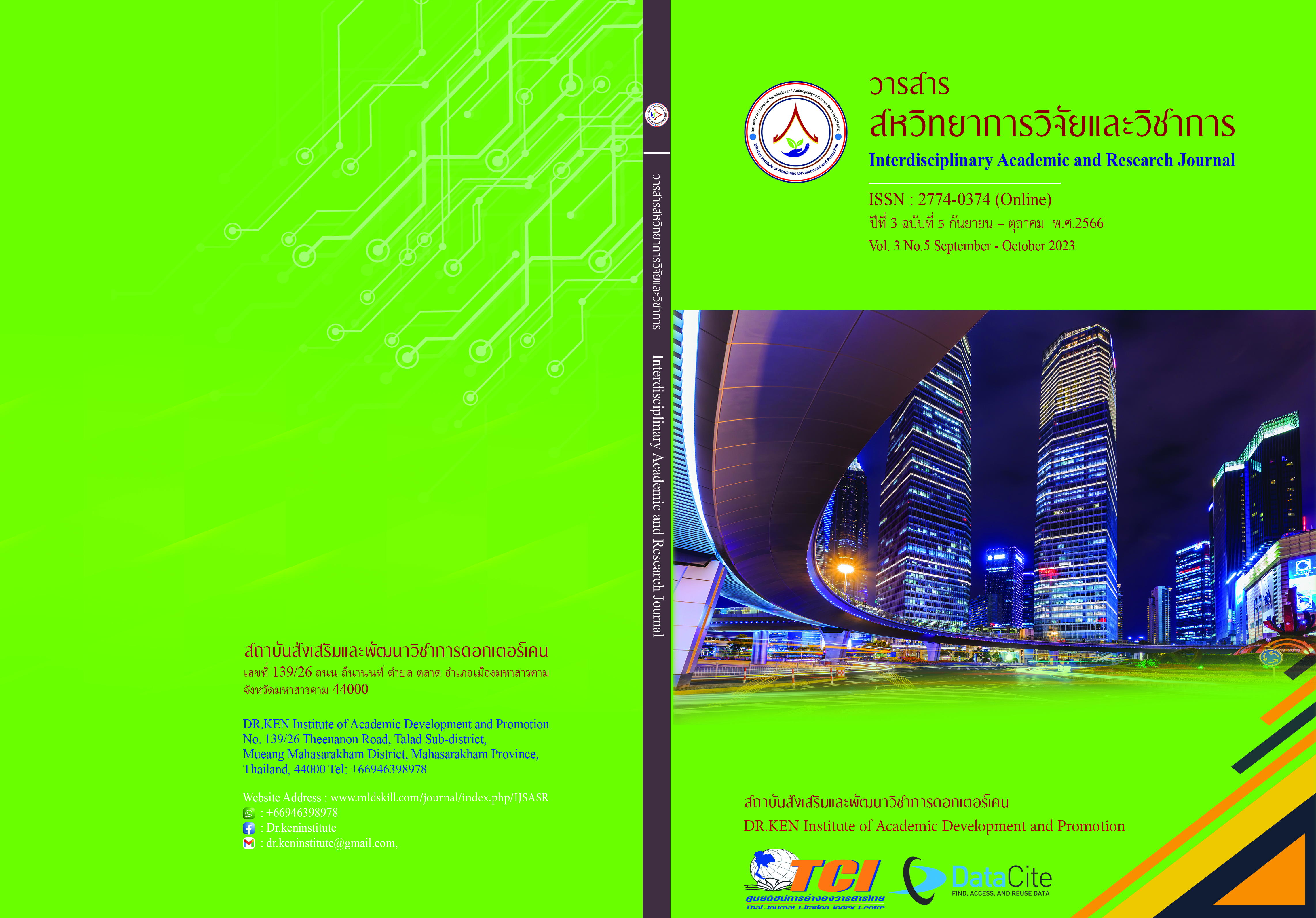Developing an Achievement Using Kahoot Games of Biographies and Works on Important Personnel in Thai Nation Creation of 8 Grade Students at Demonstration School of Thepsatri Rajabhat University
DOI:
https://doi.org/10.14456/iarj.2023.283Keywords:
Kahoot Game; , Learning Management by Using Games; , Academic AchievementAbstract
A teaching style that supports critical thinking and problem solving and an interactive student-based approach that uses flexible lessons, emphasis is placed on exploring learning that encourages learners, and learners respect the value of diversity. However, to achieve the goal of the education plan that wants Thai people to learn for life with quality, online quiz game applications (Kahoot) is one of the best alternatives. Thus, this research aimed to develop lesson plans using Kahoot games, to compare academic achievement before and after studying, and to study the satisfaction of 2nd year of secondary education after studying with Kahoot games under the subject of Biographies and Works of Famous People in the Creation of Thai Nation. The samples from purposive sampling included 50 students in 2nd year of secondary education, Class 6, Demonstration School of Thepsatri Rajabhat University in 1st semester of the academic year 2022. Research instruments included 15 lesson plans, achievement tests with 30 questions, and satisfaction surveys in three dimensions totaling 18 questions. Statistics employed were average, standard deviation, and dependent t-test. Findings show that (1) Fifteen lesson plans using Kahoot games under the subject of Biographies and Works of Famous People in the Creation of Thai Nation for 2nd year of secondary education students had an Index of Item Objective Congruence of between 0.67 to 1.00 with an average of 0.89. (2) The comparison result of academic achievement using Kahoot games under the subject of Biographies and Works of Famous People in the Creation of Thai Nation after studying was higher than the result before studying at the statistically significant level of .05. (3) The result of student satisfaction of 2nd year of secondary education after studying with Kahoot games under the subject of Biographies and Works of Famous People in the Creation of Thai Nation was overall at the highest level.
References
ทิศนา แขมมณี. (2556). ศาสตร์การสอน: องค์ความรู้เพื่อการจัดกระบวนการเรียนรู้ที่มีประสิทธิภาพ. กรุงเทพฯ: บริษัท ด่านสุทธาการพิมพ์ จำกัด.
นรีลักษณ์ ปัทมะทัตต์. (2560). การใช้สื่อการสอน Kahoot เพื่อเพิ่มผลสัมฤทธิ์ทางการเรียนของนักเรียนระดับมัธยมศึกษาปีที่ 4. Retrieved October 22, 2022, from http://www.swis.act.ac.th/html_edu/act/temp_emp_research/2813.pdf.
บอพิศ เวิดสูงเนิน. (2561). การประยุกต์ใช้รูปแบบกิจกรรมผ่านเกม Kahoot รายวิชาบัญชีต้นทุน 2 นักศึกษา ปวส.1 สาขาวิชาการบัญชี. เพชรบูรณ์: วิทยาลัยการอาชีพวิเชียรบุรี.
บุญชม ศรีสะอาด. (2546). การวิจัยสำหรับครู. กรุงเทพฯ: สุวีริยาสาส์น.
ประไพ สุวรรณสารคุณ และวัชรา เล่าเรียนดี. (2554). การพัฒนาผลสัมฤทธิ์ทางการเรียนด้านการเขียนสะกดคำยากของนักเรียนชั้นประถมศึกษาปีที่ 3 ด้วยการจัดการเรียนรู้โดยใช้เกมการศึกษา. วารสารศิลปากรศึกษาศาสตร์วิจัย, 2(2), 211-221.
ปิยะนุช เทือกเทพ. (2563). ผลสัมฤทธิ์และผลจากการจัดการเรียนรู้โดยใช้สื่อผ่านเกม. วารสารวิชาการมหาวิทยาลัยราชภัฏกาญจนบุรี, 9(2), 175-241.
เยาวภา ประคองศิลป์. (2542). ถึงเวลาหรือยังที่คนในท้องถิ่นควรให้ความสนใจประวัติศาสตร์ท้องถิ่น. วารสารศูนย์บริการวิชาการ, 7(3), 64-71.
โรงเรียนสาธิตมหาวิทยาลัยราชภัฏเทพสตรี. (2564). เอกสารสรุปฝ่ายวิชาการ. ลพบุรี: โรงเรียนสาธิตมหาวิทยาลัยราชภัฏเทพสตรี.
โรงเรียนสาธิตมหาวิทยาลัยราชภัฏเทพสตรี. (2565). ข้อมูลนักเรียน. ลพบุรี: โรงเรียนสาธิตมหาวิทยาลัยราชภัฏเทพสตรี.
ศิริลักษณ์ เลิศหิรัญทรัพย์. (2560). การพัฒนาผลสัมฤทธิ์ทางการเรียนวิชาคอมพิวเตอร์โดยช้ แอปพลิเคชั่นคาฮูท ในการจัดการเรียนการสอน ของนักเรียนชั้นประถมศึกษาปีที่ 6 โรงเรียนสาธิตมหาวิทยาลัยราชภัฎสวนสุนันทา. Retrieved October 22, 2022, from http://elsd.ssru.ac.th/siriluck_le/pluginfile.php/141/block_html/content/วิจัยในชั้นเรียน2560.pdf.
สมศักดิ์ ชูโต. (2527). การสอนวิชาประวัติศาสตร์ไทย. กรุงเทพฯ : โรงพิมพ์ไทยวัฒนาพานิช.
สุธนา สิริธนดีพันธ์. (2561). ผลการใช้ชุดกิจกรรมควบคู่กับการใช้แอปพลิเคชั่นคาฮูท เพื่อพัฒนา ทักษะการแต่งประโยคของนักเรียนชั้นประถมศึกษาปีที่ 1 โรงเรียนสาธิตมหาวิทยาลัยราชภัฏสวนสุนันทา (Unpublished Master’s thesis). กรุงเทพฯ: มหาวิทยาลัยราชภัฏสวนสุนันทา.
สุไรยา หมะจิ. (2563). สภาพและปัญหาการจัดการเรียนรู้รายวิชาวิชาประวัติศาสตร์ สำหรับนักเรียนชั้นประถมศึกษาปีที่ 4 โรงเรียนเอกชนในสังกัดสำนักงานศึกษาธิการ อำเภอหัวไทร จังหวัดนครศรีธรรมราช, 639-650 ใน รายงานการประชุมหาดใหญ่วิชาการระดับชาติและนานาชาติครั้งที่ 11. สงขลา: มหาวิทยาลัยหาดใหญ่.
Allen. I.E., & Seaman, J. (2010). Learning on demand: Online education in the United States, 2009. Sloan Consortium. PO Box 1238, Newburyport, MA 01950.
Cronbach, L.J. (1970). Essentials of Psychological Test. 5th edition. New York: Harper Collins.
Dellos, R. (2015). Kahoot! A digital game resource for learning. International Journal of Instructional Technology and Distance Learning, 12(4), 49-52.
Hussein, B.A. (2015). A blended learning approach to teaching project management: A model for active Participation and involvement: Insights from Norway. Education Sciences, 5(2), 104-129.
Ismail, M., & Mohammad, J. A. (2017). Kahoot: A Promising Tool for Formative Assessment in Medical Education. Education in Medicine Journal, 9(2), 19-26.
Kuder, Frederic G., & M.W. Richardson. (1937). The Theory of the Estimation of Test Reliability. Psychometrika, 2(9), 151-160.
Meijen. (2017). Student Engagement Kahoot: School of Sport and Exercise Sciences. Retrieved October 22, 2022, from https://www.kent.ac.uk/elearning/files/kahoot.pdf.
Downloads
Published
How to Cite
Issue
Section
License
Copyright (c) 2023 Veeravit Boonsong, Jirayut Bucha, Anyanee Sihawong

This work is licensed under a Creative Commons Attribution-NonCommercial-NoDerivatives 4.0 International License.
Copyright on any article in the Interdisciplinary Academic and Research Journal is retained by the author(s) under the under the Creative Commons Attribution-NonCommercial-NoDerivatives 4.0 International License. Permission to use text, content, images, etc. of publication. Any user to read, download, copy, distribute, print, search, or link to the full texts of articles, crawl them for indexing, pass them as data to software, or use them for any other lawful purpose. But do not use it for commercial use or with the intent to benefit any business.
















.png)


